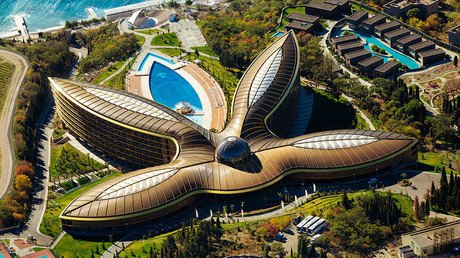Austrian ‘Russiagate’ victim, resigned Vice-Chancellor Strache reveals behind-the-scenes play to RT
A clip where Austrian ex-vice-chancellor supposedly fell into a trap with fake “Russian money” succeeded in breaking up the right-wing coalition. But Heinz-Christian Strache says he’ll return to politics once his name is cleared.
Speaking to RT Deutsch in his first detailed interview since the scandal erupted in May, Strache revealed the behind-the-scenes promises allegedly made and broken in the wake of the scandal known as ‘Ibiza gate’, which ended in a coalition break-up, a minister cull, the resignation of Chancellor Sebastian Kurz, and an early election set for September 29.
Also on rt.com ‘Russian oligarch’s niece’ was student paid to set up Austrian Vice-Chancellor Strache – paperBut Strache, who called the video “a honey trap stage-managed by intelligence agencies,” is certain he will make a comeback. “After the investigation is over, I can certainly go back into politics. I already said that the investigation is now of the highest priority,” he told RT.
‘Kurz promised to save the govt’
Strache was the leader of the Freedom Party (FPÖ) and the second-ranking official in the cabinet after Kurz, who heads the People’s Party (ÖVP). The video, sent to several outlets, showed Strache discussing shady and potentially illegal deals with a mystery woman, who claimed to be a niece of a Russian oligarch. It has since emerged the woman Strache met was apparently a hired actress, possibly of Bosnian origin, while the Russian businessman whose name was used in the operation confirmed he neither had a niece, nor siblings.
But the damage had already been done, as the ‘Ibiza gate’ blew up the coalition between the center-right ÖVP and right-wing FPÖ, shattering trust.
Austria's Kurz bewildered by no confidence motion toppled at his government despite his party’s success in EU electionshttps://t.co/lelhRVE7tM
— RT (@RT_com) May 28, 2019
Now Strache says Kurz initially promised him in a conversation that the coalition government would survive the scandal, but for some reason, made a swift U-turn.
The fact is that I was openly promised … from the side of the Federal Chancellor that when I step down this well-working government would continue its work. My deputy, my right hand, Dr. Norbert Hofer, would be invited to continue the government work as the future Vice Chancellor. And then this [promise] was not kept.
The two parties couldn’t reach an agreement on whether the then-Interior Minister Herbert Kickl of the FPÖ should keep his office and be responsible for the investigation into the fateful video. Strache says he was surprised by Kurz, who on the day of Strache’s resignation “called me by phone and said that everything had changed and he now demands the resignation of the Interior Minister Herbert Kickl” as well as his own.
After Kurz insisted on sacking Kickl, the coalition failed, and the chancellor was also deposed through a vote of no-confidence.
‘We irritated lots of people in EU’
Strache insists the video misrepresented him, that it was filmed two years ago, and that it was in essence a ticking-time-bomb tool used by some political rival.
Also on rt.com The honey trap that wasn’t what it seemed: What was really behind ‘Operation Strache’?Notably, the scandal was conveniently timed just 10 days before the European Parliament elections. While Strache wouldn’t openly suggest who could be behind the release, he said the actual target was not just him, but the Austrian ruling coalition and the Eurosceptic right.
In this small country in the heart of Europe there was a right-wing conservative government and it was a big deal, this experience could set an example to the rest of Europe. It’s hard to deny that in neighboring Germany many people were sympathetic to this government, though German Federal Chancellor [Angela] Merkel probably say it in a different way. We certainly irritated a lot of people.
Some more “irritating” views of Strache could include his criticism of sanctions against Russia and calls for business-like relations with Moscow from the position of neutrality, which he reiterated in the interview. Even with all the fallout from the affair, Strache managed to get elected into EU’s legislative body. After initially accepting the new job, he later refused the seat, saying that if he regains his role as a politician, it would be one in Vienna, not Brussels.
Watch the entire exclusive interview with Strache on RT Deutsch.
Subscribe to RT newsletter to get stories the mainstream media won’t tell you.














